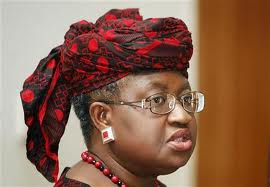 |
| Finance Minister, Ngozi Okonjo-Iweala |
The finance minister said the plan of Mr. Jonathan’s administration is to restore security and order.
Despite the threat of national insecurity, which has seen a state of emergency imposed in three states in the North Eastern part of Nigeria, the Finance Minister and Coordinating Minister for the Economy, Ngozi Okonjo-Iweala, on Monday said she is still confident the fundamentals of the economy remain strong.
The minister, who stated this during a conference call from her office with 112 analysts and global investment experts, identified several positive indices that gives her the confidence, namely economic growth at 6.5 per cent in the first three months of 2013; inflation down to single digit; fiscal deficit at only 1.8 per cent of gross domestic product, GDP, and foreign reserves at $48 billion.
With government promising to continue to work hard on many projects that would impact positively on the populace, Ms Okonjo-Iweala said the outlook of the economy remained very bright.
On the implications of the state of emergency declared last week by President Goodluck Jonathan in Yobe, Borno and Adamawa States on the nation’s economy, the minister said that the Federal Government is taking decisive actions to secure communities in the North Eastern part of the region affected by the activities of Boko Haram.
According to her, the intention of government with the action is to restore security and order to enable economic activities and normal life resume in the region, adding that the state of emergency was to give security agents the latitude to flush out insurgents from their bases.
On the strategies adopted by the government to ensure the success of the state of emergency in the affected states, Ms. Okonjo-Iweala said the presidency is adopting a multidimensional approach involving political dialogue, counter-terrorism tools and economic inclusion to solve the problem, adding that government’s expectation is the return of peace to ensure a strong foundation to spur economic growth, particularly through agriculture, the mainstay of the region.
While security forces continue to do their job, the presidential committee on amnesty is expected to also continue its work, the Minister said, adding that the President was particularly pained that the crisis had affected education.
The minister said it is unacceptable for children and teachers to be denied opportunity to go to school.
On efforts to diversify the economy, Ms. Okonjo-Iweala stated that the reform agenda was yielding fruits, with the agricultural sector being revolutionized to run on a profitable basis with access to fertilizer and improved seeds through more efficient, private sector methods.
She said that farmers were also being linked to markets to support them to achieve more productivity and better profit margins, saying farmers in the Northern part of the country were able to produce 1.3 metric tonnes of rice in the dry season this year.
To diversify the economic base, the Minister said there are plans for the development of the mining sector to translate to other minerals, such as coal, gold, and bitumen, adding that government was working hard at land titles, foreclosures, funding and other issues to fast-track the development of the housing sector.
On supplementary budget to tackle security challenges, the minister said that a Contingency Vote was already built into the 2013 budget to take care of emergencies such as security challenges and the flooding that affected many parts of the country last year.
To broaden the nation’s tax revenue generation capacity at the non-oil sector, the Minister said at the forum organized by Standard Chartered Bank that government would next month launch a new system which would ensure that though tax rate would remain, greater focus would be on corporate organizations that are currently not paying taxes.
Premium Times
